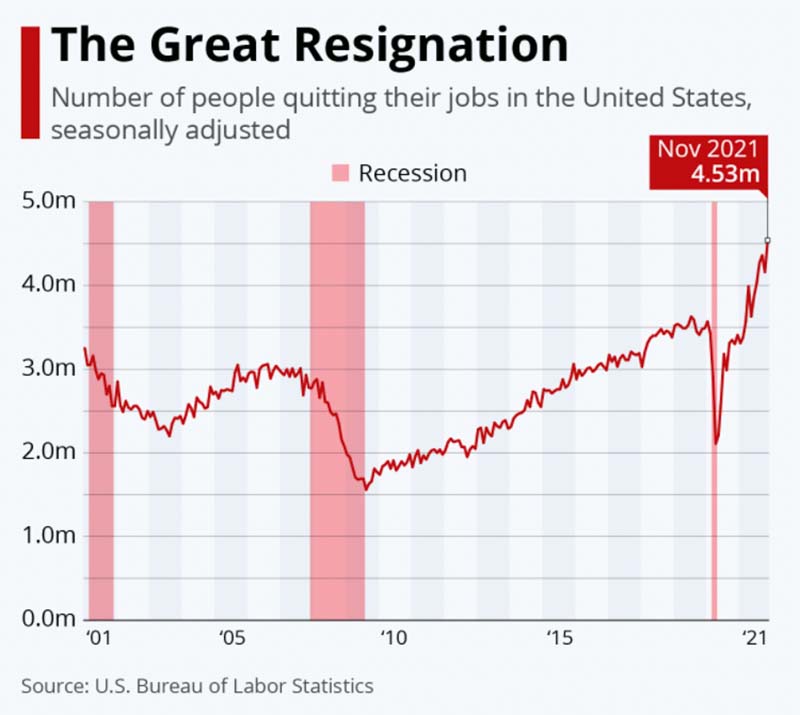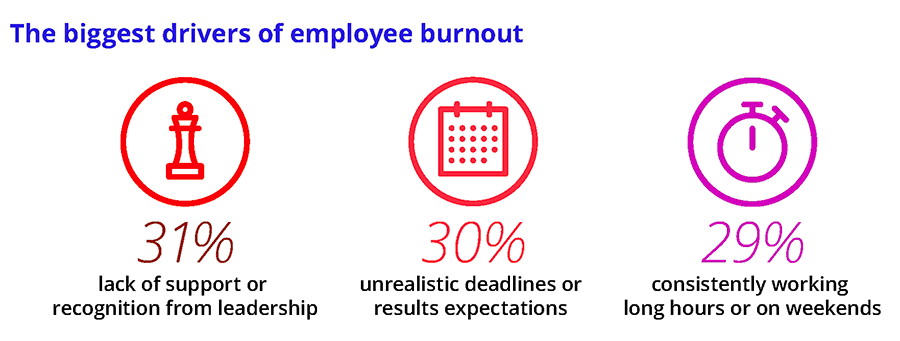What are Flex Fridays?
In this article, we’ll be covering flex Fridays–one of the ways companies are trying to improve the working conditions of their employees.

The 40-hour work week has been synonymous with full-time employment for decades. However, times are changing, "the Great Resignation" is in full swing with employee burnout currently at an all-time high. Job satisfaction rates are plummeting; something clearly needs to change. Evidence of the Great Resignation can be seen by the record number of people are leaving the workforce:

As companies try to find solutions to improve the quality of life of their employees, many are experimenting with remote work, shorter working hours, incentive programs, and more. Instead of a narrow focus on productivity at the expense of employee satisfaction, employers are (or should be) trying to strike a more ideal work-life balance. Not only does this boost productivity, but it also boosts employee satisfaction and loyalty to the company.
Flex Fridays are a different kind of flexible working arrangement which is related to the 4 day work week. By the end of this post you should have a good idea about what the practice entails and whether it’s the right move for your business so let’s get started!
What Are Flex Fridays?
Flex (or Flexible) Fridays are all about giving employees the freedom to choose how they’d like to spend their time. If employees want to work on a Flex Friday, they’re free to do so. If they’d rather spend time with their families, that’s fine too! The only rule is that nothing can be scheduled for a Flex Friday–no mandatory meetings, no check-ins, and no contact (unless it’s a _real _emergency).
The premise is pretty simple: your employees are intelligent people who are (generally) capable of managing their time in a way that’s best for them. Beyond that point, when employees are given the freedom to manage their schedules in a way that’s optimal for them, the entire company benefits. People are happier, more enthusiastic, more productive, and grateful for their opportunities.
Anyone searching for long-term employment should look at Flex Fridays as an indication that a company priorities the experience of its employees. Having personal time to enhance work or personal goals leads to an environment that is stimulating and fulfilling. Employees are a company's greatest resource, and Flex Fridays show that a company truly believes this.
Which Companies Have Flex Fridays?
One example of this practice in action comes from Cockroach Labs, which introduced "Free Fridays" in 2016. Employees were allowed to use their Fridays for anything–continuing work as they normally would, leaving work to spend time with family, or doing something to improve their mental health.
Cockroach Labs loved the idea of Free Fridays, but management soon found that some departments could not function without employees on-call 5 days a week. In order to maintain Flex Fridays, the company made its definition department-specific. On their site they describe Flex Fridays as:
"A Free Friday is a new kind of day that breaks up the traditional 5-day work week, providing all employees with the opportunity to have one day a week where they are in complete control and can self-manage."
In other words, each department was allowed to define their flexibility in a manner that optimized the work-life balance for employees within the department’s jurisdiction.
This includes multiple variations on the theme, such as:
- No Meetings: Meetings are never scheduled on certain days.
- Continuing Education: Employees can take time off from work or leave early to pursue educational opportunities.
- Free Time: Employees can take a certain amount of time off to run errands or spend time with family.
- Self-Directed Work: No check-ins or direction from company management—just employees working on the projects they feel are most important!
These variations of Flex Fridays have worked to enhance employee satisfaction and work-life balance at the company, and others have taken note. The idea has been spreading around the developed world like wildfire.
Here are some other companies that have adopted their own version of Flex Fridays:
Would you like a 4 day work week?
TransUnion
TransUnion allowed 900 of its employees in the United Kingdom to take Friday afternoons off in response to COVID-19 pandemic stress. These afternoons offered employees the chance to decompress and practice self-care, whether that meant meditation or catching up with friends and family.
Tinuiti
Pandemic-related stay-at-home orders were the impetus for organizational changes at countless companies around the world. For Tinuiti, Flex Fridays were an important part of that organizational change. At 1:00 PM on Fridays, employees are free to stop working. They don't need to stop, rather, employees have the option to leave early to work on personal matters like their well-being.
Front
Friday meetings are never popular with employees. That's why Front stopped having meetings on Fridays and made the day flexible. Employees who work from home are not required to be logged in, and in-office employees are free to stay at home. Working isn’t required, but anyone who wants to keep the week’s momentum going is free to do so!
Flex Fridays vs. Summer Fridays
As noted by Cockroach Labs, Flex Fridays are only one way to provide the opportunity for rest, relaxation, and self-improvement for employees. Their "Free Fridays" evolved into "Flex Fridays", while other companies have started holding "Summer Fridays".
Summer Fridays are Flex Fridays, but only during the summer. Companies have realized that people have been missing out on summer nights with friends and family vacations. That takes a toll on mental health!
To rectify this, many have started making Friday’s work-optional during the summer. Sometimes, Summer Fridays are done on a rotational basis, meaning some employees are working on any given Friday. Sometimes, Summer Friday’s are company-wide.
Flex Fridays vs. 4-Day Work Week
You might be wondering: why not just find a job with a 4-day workweek and forget about Flex Fridays altogether? Well, it turns out that many employees don’t actually want an extra weekend day. Instead, they want the freedom to choose whether a task needs their attention.
After implementing Flex Fridays, Front noted that:
- Around 44% of employees used Fridays to do some work.
- Around 44% of employees used Friday as a normal work day.
- Less than 10% of employees took the entire day off.
While the 4-day work week may be a big draw, the statistics from Front show that there is an advantage to offering flexibility on Fridays.
Flex Fridays Give Employees What They Need
Currently, the need for Flex Friday’s is high. As we mentioned earlier, burnout is currently at an all-time high. Around 77% of workers and 84% of millennial workers report burnout as a result of stress at their current jobs. The current state of workplace stress is so bad that surveys regularly find that around 40% of workers have quit a job due to burnout. Something needs to change.

Employees want (and need) the companies they work for to commit to improving their working conditions. No, that doesn’t mean nicer office spaces with free amenities (although, those are welcome). It means giving employees more freedom to direct themselves and their time in productive and healthy ways. That’s where Flex Friday’s come in.
Flex Fridays are facilitating this rebalancing act by allowing people the freedom to take a bit of extra time for themselves if they need it. This benefits any organization because employees are motivated to be productive, and it benefits any employee because they know that their needs are met.
Negotiating A Flex Friday Job
If your dream job opening doesn't offer any flexibility in its schedule, all is not lost. Read through the employee handbook regarding their scheduling policy, and look for areas where the Flex Fridays model could fit in.
Then, research the benefits of flex scheduling and be ready to negotiate. Managers and other decision-makers may be skeptical of the benefits, so ask for a trial period. Once they see the benefit, any company that values its employees and its bottom line will maintain this "perk" for the long run.
Flex Fridays are not the norm… yet. However, they are catching on quickly as a superb recruitment tool and excellent morale booster. In today's job market, if a company wants you, they’ll need to be willing to provide you with a healthy work-life balance. One step further is to offer a 4 day work week.
